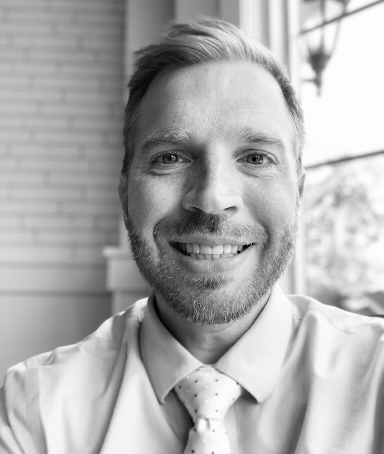Matthew Schutz has served on the Luther Seminary business team as controller for several years and recently became our senior director of finance and human resources. We connected with Matthew to learn more about his interest in finances and how he approaches his work.
Where did you grow up and what first got you interested in business and finances?
I grew up in Brookfield, Wisconsin, a small suburb of Milwaukee, and went to UW-Milwaukee for my undergraduate studies in pre-law. I was always really interested in law and had always admired an aunt and uncle who were both attorneys, so I had planned to go to Marquette University’s law school. But the 2007–2008 financial crisis caused me to rethink the acquisition of lots of student loan debt. I was working at a bank at the time and experienced firsthand a series of takeovers. In discussing all of this with my aunt, I found out she also had an accounting degree and recommended I look into accounting both because it would open doors if I went into tax law and because she knew I was good with numbers. I earned a master’s degree in accounting in 2009.

I really enjoyed studying and learning accounting and earning my CPA. I worked for the University of Wisconsin system right out of college and for the next 8 years. I met my wife in graduate school, and she recommended we move (back, for her) to Minnesota. The Twin Cities provided lots of employment opportunities for her as a law librarian and for me to practice public accounting, thinking specifically about getting into the nonprofit accounting field. Baker Tilly’s Minneapolis office is the hub for lots of institutions of higher education, including many local institutions. In collaborating with so many local nonprofits, including Luther Seminary, I realized how much I enjoyed supporting institutions of higher education and how much I wasn’t enjoying the constant travel involved with serving as a public accountant. I worked at the University of Minnesota Physicians for five years and, when this position opened, decided to look at moving to a job with this former client where I knew it would be a great fit. I loved being on the campus, and I love the people and the culture here.
What’s your approach to translating financial data for colleagues who aren’t “into numbers”?
I think of the numbers as telling a story, which they do! I use analogies and metaphors, anything that will help someone have an “aha” moment. Usually, the most helpful thing is to imagine finances at a personal level and scale them up. Most of us are familiar with the basic management of household finances, and many principles in institutional finances have household comparisons. The useful life of a car an individual might own could be compared to the useful life of office equipment or office space or some other physical asset a nonprofit might own. And just like at home, emergencies can come up and strategies can shift. I do my best to keep people’s interest and provide helpful answers so they can better do their jobs.
What’s the transition into human resources been like for you?
Taking on this leadership role in human resources has helped scratch the itch of my deep interest in law. And the language of human resources often gets into things like policy and compliance, which are also related to law and also to economics and finance. Accounting processes always benefit from standardization and organization, and I like bringing that inclination to things like compliance and policy as well. The human resources team will be communicating as clearly as possible, and we will encourage everyone to trust the process. We are totally open to feedback about processes and also want to hear more about the content of our policies and how we can improve. We want to ensure our processes are always improving so that we’re all equipped to sustain the mission of Luther Seminary.
What are you most excited about at the seminary right now?
We have accomplished a lot already with this business team and, more recently, with the human resources team, and I am hoping we can maintain a steady presence. I want people to know these are dependable teams with excellent processes in place. I’m excited about breaking down imaginary silos of people in their own work, so that more of us know that cross-departmental projects are the norm, are beneficial, and can be supported by the business and human resources teams. Different teams interpret and implement budget and other policies in different ways, and when teams collaborate, they often learn a lot from each other and improve their own processes. So I’m hoping we can support and foster more of that. We have good and also adaptable processes in place for making changes through quiet times and times of transition as the seminary moves into a hopeful future.